Black Friday on eCommerce Reports
Black Friday has routinely been the busiest shopping day since 2015, and the traditional holiday shopping season is about to kick off again. Surprisingly, since 2020 this day has received some movements encouraging people to not buy anything. However, the statistics show that nothing stops the online sales revenue to grow.

Nov 12 2021 ● 6 min read

Find out about: What people are planning on subreddit; Which brands are boycotting Black Friday; What are the 2021 Black Friday predictions for eCommerce and how it's going to look on this year's eCommerce reports.
Couch commerce
In 2020, 80% of Americans shopped on Black Friday on some form of online store. To compare, about 58 million people shopped online in 2019 and 263 million last year. The main reason why numbers skyrocketed is, of course, due to Covid-19.
This is where the term "couch commerce" originated. Shopping online while working on that turkey is becoming a new Thanksgiving dinner tradition in the United States. Due to this new shopping behavior, Black Friday deals on mobile devices surpassed 100M, 8% higher than in 2019. Those are some insane conversion rates!
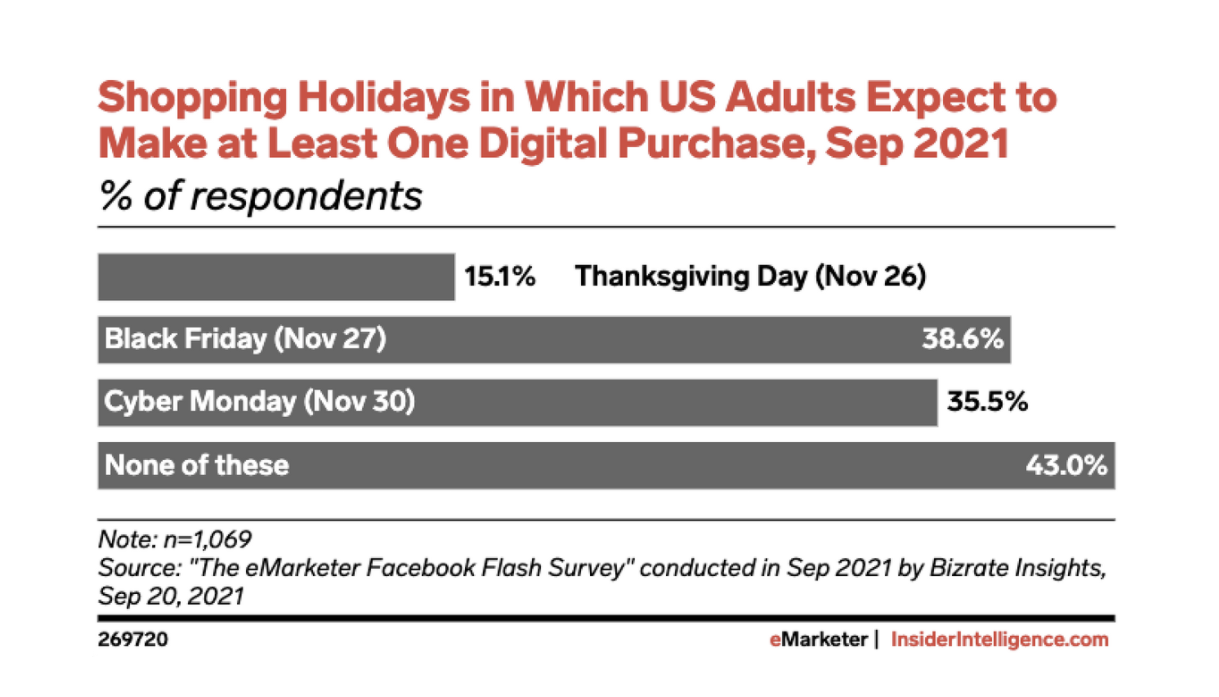
Boycott Black Friday
Even though the total revenue and the number of Black Friday fans are increasing, the opposing side is trying to be heard. Last year the economist Yanis Varoufakis has called for a one-day boycott of Amazon on Black Friday. Why the attack?
- Worker exploitation;
- The company fights tax laws that could support local economies;
- Creates excessive packaging waste;
- Is powered by fossil fuels.
Amazon is not the only eCommerce business that has been accused of unethical and environmentally harmful practices. The Coca-Cola Company, PepsiCo and Nestlé are all known for similar reasons. Due to the rising consumerism and harmful practices, people and small online stores and businesses have begun to take action.
One of these actions is the Black Friday strike. People on Reddit are organizing a national boycott of Black Friday as a form of financial protest. Almost 80,000 people are expected to join this movement.
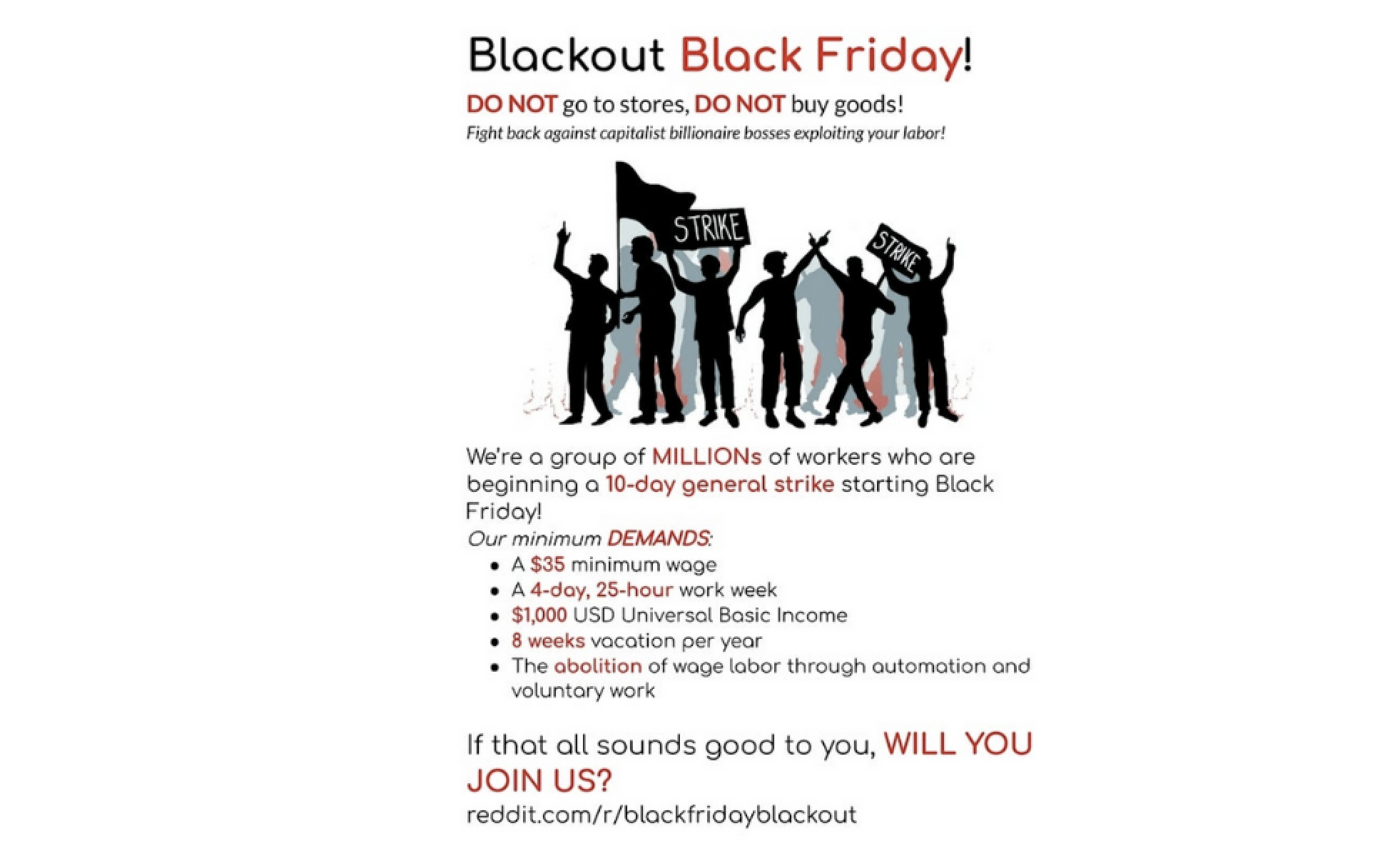
Furthermore, small businesses like Allbirds, Patagonia, HURR and Asket are all joining the boycott. The main reason is that it has been reported that 60% of businesses that have closed due to the pandemic are permanent, whereas Amazon's founder has seen an 80% increase in his net worth.
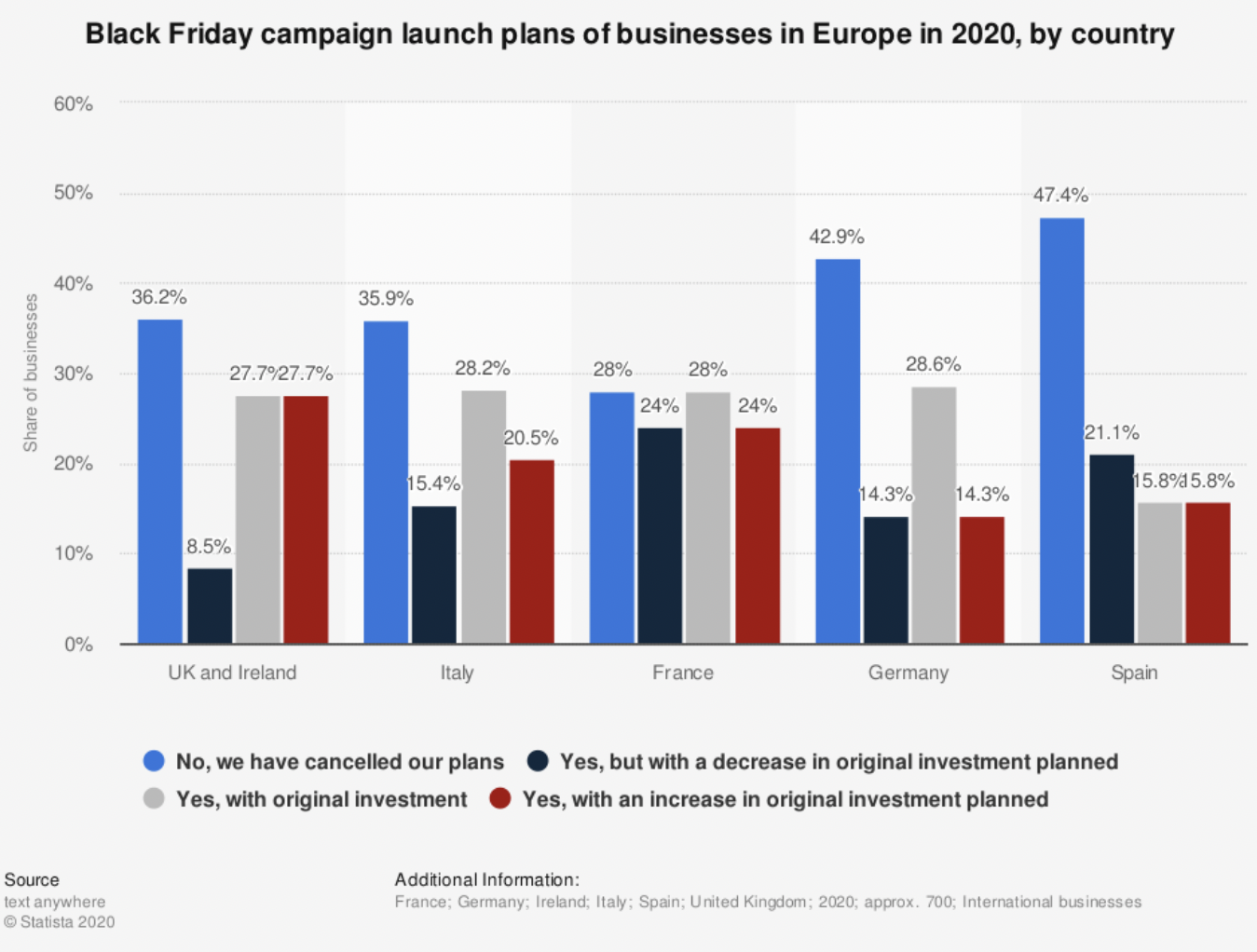
Should you worry about these boycotts?
It depends on your brand and customer segments. If you want your brand to be known for being eco-friendly and ethical, then yes. Cancel culture is harsh, and if you want to be seen as ethical while running an eCommerce site, your business may end up 'cancelled'. Eco-friendliness and ethical consumerism are highly valued in today's society.
However, if you don't want to be known as either of those things, there's no need to worry for the time being. There is no evidence that boycotts harm businesses.
Early deals
Amazon, Best Buy, Walmart and Target have already started their Black Friday sales events this year. And as you can tell from the screenshot, many companies have released discounts even before the actual Black Friday.
These early marketing efforts show that companies are battling pandemic-related supply-chain disruptions. There is also inflationary pressure on top of a labor shortage. To help, retailers are offering holiday deals even earlier to spread out the normal shopping rush before the holiday getaways start.
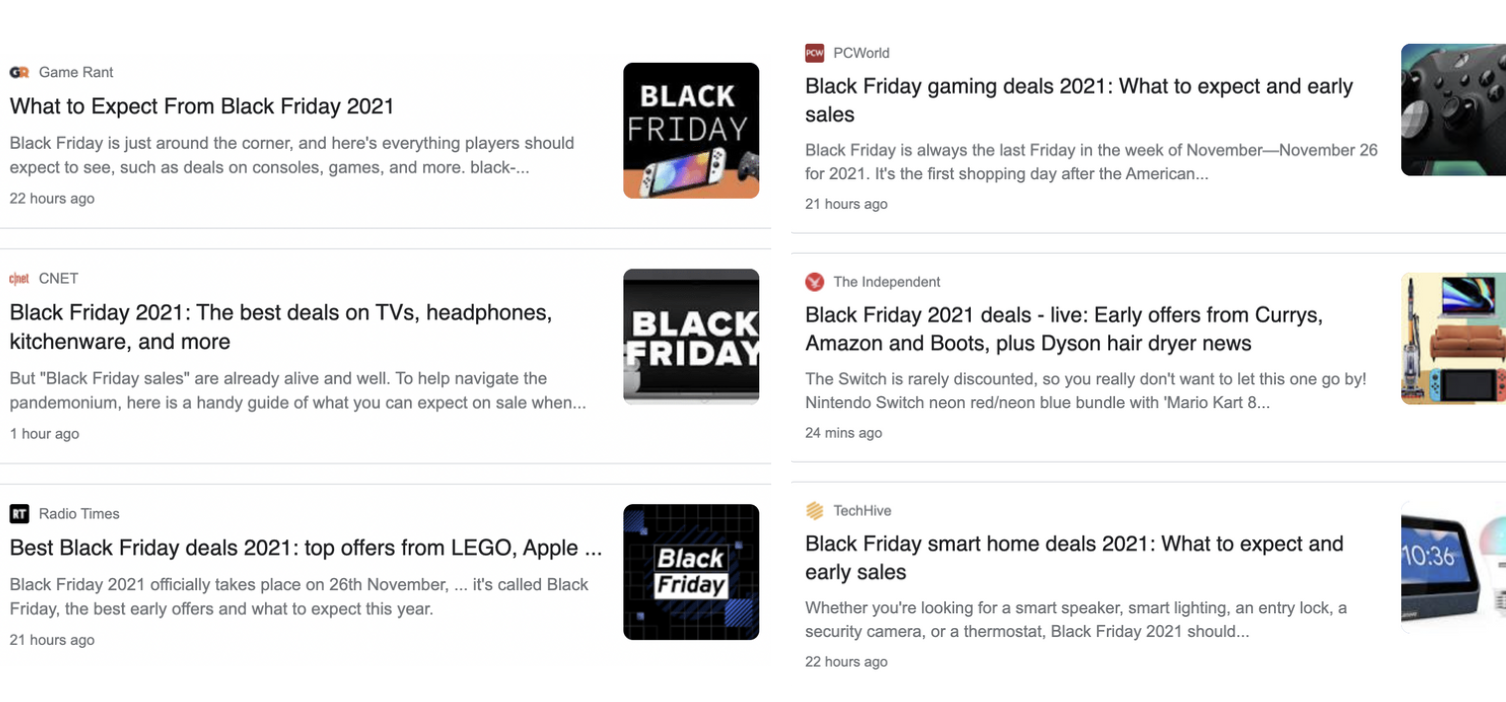
Black Friday in 2021
Insider Intelligence anticipates that each of the Cyber Five shopping days will exceed $5 billion, with the top two days—Cyber Monday and Black Friday—exceeding $10 billion. In 2020, Black Friday alone saw sales of over $9 billion in online sales.
It is also predicted that online store sales will outpace in-store sales even more as people try to avoid crowds and stay safe during the pandemic. There are also other factors playing in as:
- People will get more sleep. There is no point in staying outside the stores overnight;
- It's easier to compare the deals;
- People can purchase goods from the comfort of their own homes.
Click-and-collect is expected to take off as research from Business Insider shows this form of purchasing more than doubled in 2020 and will only continue to grow until 2024.
In general, it is predicted that the Cyber Five will deliver more sales and solid (if unspectacular) growth rates. The holiday eCommerce period will most likely increase sales from 18.4% to 18.5% but still down from its high of 20.0% in 2019. Expect all marketing channels to be flooded soon.
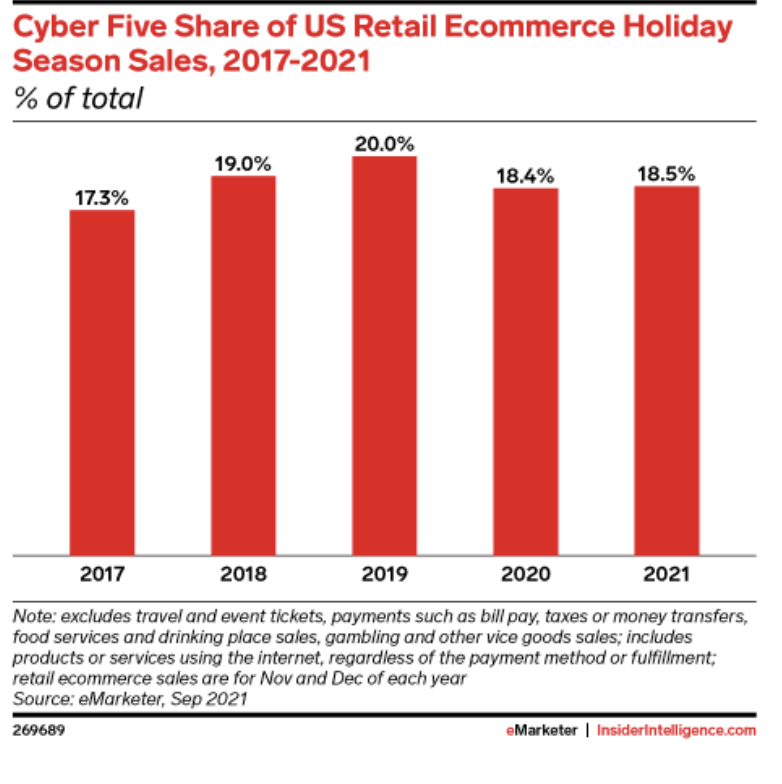
How will your eCommerce reports look like?
Big corporates are already giving out the best deals to people. It would seem those small businesses wouldn't even have a chance to compete. Yet they do. Here is what they need to do:
- Improve your page load. Research has shown that a page’s load time directly impacts the bounce rate. And customers are somewhat impatient. As soon as the page load time surpasses 3 seconds, the bounce rate soars to 38%;
- Integrate elements of trust in your online shop. Taking a look at the increase in online purchases since the outbreak of the coronavirus, fake stores have proliferated on the internet. Make sure your online store showcases trust certifications, other customers' positive reviews and your payment methods work perfectly;
- Keep an eye on your average order value. Bundle items together, offer strategic discounts on the relevant stock and find ways to integrate these deals into your marketing campaigns;
- Distribute your Black Friday offers to your email subscribers earlier, so you keep them engaged and make them feel special;
- Simplify your checkout process. Review the steps your customers have to take to checkout. If you find ways to reduce them, your eCommerce performance will rise due to convenience;
- Make loyal customers. With eCommerce reports, analyze customer behavior, see customer loyalty rates and find out how much customers are willing to spend online (average order value). This way, you'll have key metrics to base your Black Friday campaign on and even attract new customers;
- Use marketing data. Find out which marketing efforts bring the most value. Then use them during Black Friday to bring more active customers to your online store;
- Use daily analytics reports. If you opened your marketing campaigns early, watch those sales reports every day. It's the perfect time to optimize the last bits of your eCommerce website before the big day starts;
- Some key metrics to track daily: eCommerce conversion rate, online store searches, net sales, customer lifetime value and average order value. For post-Black Friday, make sure to look at the product performance report to see what sold best.
Final advice
Black Friday is not going anywhere. By all eCommerce reporting and customer behavior analysis, customers love shopping with great deals. Through the emerging resistance and the onslaught of Google shopping ads and social media ads, it can be hard to get through to customers.
But don't panic. Start your marketing campaigns early. Make the online store accessible to new customers and welcoming to existing customers. Dive into old eCommerce reports for historic Black Friday and see what worked best. You have analytics reports on your side. Use them and benefit from Black Friday.
If you want some extra advice on what metrics to track in your eCommerce reports, here's an article for that.
Published on Nov 12 2021

WRITTEN BY
Dominyka VaičiūnaitėDominyka is a copywriter at Whatagraph with a background in product marketing and customer success. Her degree in Mass Communications/Media Studies helps her to use simple words to explain complex ideas. In addition to adding value to our landing pages, you can find her name behind numerous product releases, in-app notifications, and guides in our help center.